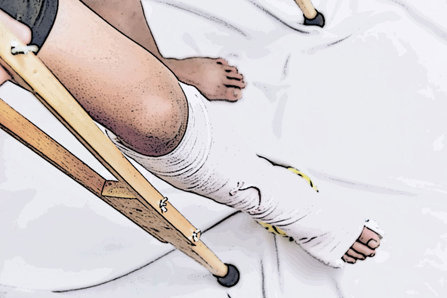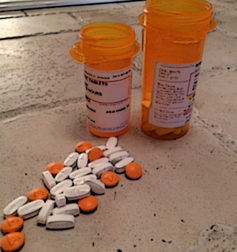Vital Information for Parents:
How to Protect Your Kids from Opioid Addiction
In some ways, it’s the toughest environment ever in which to raise children. Sure, there were more deadly diseases before antibiotics and clean water. But in earlier times, there weren’t as many ways to lose your children to drugs or alcohol. Now, there are deadly drugs virtually on every street corner. And more powerful intoxicants can be obtained from overseas manufacturers with just a credit card and a mailing address.
In this new millennium, it’s vital that parents know how to protect their children from any temptation to reach for drugs or alcohol. It helps to realize that there are certain circumstances that open the door wider to future opioid abuse and addiction. Should these circumstances arise, vigilance can prevent serious problems from ever arising.
These two circumstances that seem so innocuous but have felled so many are athletic injuriesand wisdom teeth extractions.

Athletic Injuries
When a teen is an avid athlete, it’s always possible that an injury may sideline him or her. We could be talking about a star quarterback or a gymnast working out many hours a day to reach the next level of competition. Accumulated wear and tear or a single accident could end their involvement in athletics for the moment. Surgery may be needed to repair injured muscles, bones or ligaments. If so, it’s very likely that opioid painkillers will be prescribed during recovery.
Painkillers may relieve the pain of the injury but the injured athlete may find that they also relieve their upset about being sidelined. Reliance on these pills for anything other than pain relief for the shortest time possible could trigger an attraction to these pills to relieve emotional ills as well as physical pain.

Wisdom Teeth Extractions
The vast majority of teens have one or more wisdom teeth removed and may have opioids prescribed for post-surgery pain by their family dentist. Among most dentists, a combination of hydrocodone and acetaminophen is the preferred post-surgery prescription. Especially for teens who are not athletic, this is likely to be their first introduction to opioid medications.
A new report from the University of Michigan has discovered that among teens and people in their twenties, those who filled a prescription for opioid painkillers after a wisdom tooth extraction were nearly three times as likely to get involved in persistent opioid use after that.
Curiosity May Be Involved
Consider how many stories you’ve heard or news reports you’ve read about our opioid epidemic. Your teen has heard many of these stories and reports, too. Some teens are going to be curious about what’s causing all the fuss. If they have a bottle of opioid painkillers in their hands, some of them are going to experiment by taking more than prescribed or by crushing a pill and snorting it.
The other possibility is that a young person who’s taking these painkillers finds that the warm, fuzzy euphoria produced by these drugs is irresistible. Jamie Lee Curtis described the feeling she got from abusing painkillers that kept her reaching for more: “The morphine becomes the warm bath from which to escape painful reality.” If that young person finds that warm oblivion more desirable than a successful, productive life, he or she could well be headed for a life of addiction.
The incredible danger here is that for some people, all it takes is one time for the drug to get its hooks into them. They simply can’t leave it alone after that. They’ve got to try it again and again and then they find they get sick if they try to lay off the drug.
This is NOT the Time to Trust Blindly
You may want to trust your child to take these medications exactly as the doctor orders. Don’t do it. Hand out the pills yourself and keep the unused ones locked up. Never waver from this procedure. Never. Know how many pills should be left in the bottle at all times.

In fact, you should keep any medications handed out to other family members locked up every moment they are not in use. Don’t forget grandma or grandpa’s pain pills on their bedside. A young person intent on getting a few pills may go visit grandma just for the purpose of stealing a few.
Even if your child would never take these pills improperly, securing these pills also prevents one of their visiting friends from filching a few pills for their own use.
Why this Urgent Need for Vigilance?
The estimated number of drug overdose deaths in 2017 is over 70,000 individuals. About two-thirds of these deaths resulted from opioids, including hydrocodone, oxycodone, heroin and illicitly-manufactured fentanyl.
Some of these people who lost their lives to overdose got started on this road through one of these two paths, athletic injury or wisdom teeth extraction. Does it seem too incredible? Check out the links at the end of this article to read about people telling their stories of getting started on opioids through one of these paths.
Also, talk to your family’s dentist or orthopedic surgeon about prescribing non-opioid painkillers after tooth extraction, surgery or injury. You can remind them that the Centers for Disease Control and Prevention recommends that patients consider other ways to manage pain than the use of opioid painkillers.
These days, it’s simply part of the job of parenting to pay close attention to those moments that open the door to addiction and use unfailing vigilance to make sure their children do not have access to pills or any medication they could abuse.
Athletes:
Dental work:
- Brittany’s tooth extraction at 16 led to addiction
- His addiction started with a wisdom tooth extraction at age 24


 ®
®